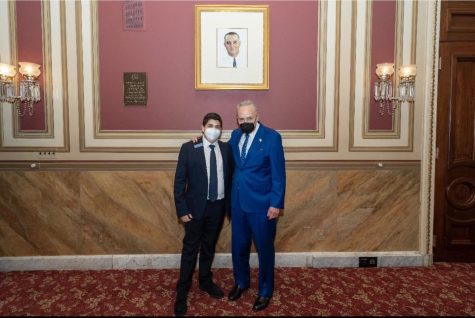Senate Page With Raymond Ashkenazie
You may know him from Sephardic Culture Club, mock trial, chessed, or even as Junior Vice President of the G.O. This past summer, Raymond Ashkenazie was selected for the Senate program where he spent time on Capitol Hill with United States Senators.
LB: What summer program did you partake in? Can you tell me a bit about your experience?
RA: This summer, I participated in the Senate Page Program. It is a program where one senator from 30 states chooses one person from their state to participate to learn about public service and democracy. It’s a 2.5-week-long program in the US Senate.
We basically worked for the Senate. We brought their bills around the Senate; we set their desks up; we were there while they were debating and passing bills.
I worked for the Democrats. We’re called Senate Pages. So the pages who were appointed by Democratic senators served the Democrats, and the ones who were appointed by Republicans served the Republican senators.
LB: Can you tell me a bit about the selection process?
RA: I heard about the program online, and there was a long application. It was an essay, three letters of recommendation (thank you Mr. Deutsch and Dr. Jucovy), and your resume and an interview. It was a few weeks [long]. They pick one person from 30 states—rising juniors and rising seniors, anybody. There were some other Jews there, but it was open to everybody, all kinds of students across the country. Those students can apply from the person who runs the program, so there are really like 40-50 people: 30 appointed by their US senator and 10-20 appointed by the person who runs the program.
LB: What did you learn from the program?
RA: The United States Senate is half of the US Congress, and their job is to pass laws and to basically at least attempt to make our lives better … by debating these bills and eventually passing them. You are able to see democracy in action … watch democracy take place … We were the only other people on the Senate floor … We were able to see how democracy works.
LB: Did the program meet your expectations? Why or why not?
RA: It was actually much cooler than I thought it would be. We heard their speeches and also all of their private conversations, hear what they were talking about, and learn from what they were saying on the Senate floor.
LB: What was your favorite memory or moment during your time on Capitol Hill?
RA: While we were there what was really cool was that a gun control bill was passed, and it was the first one in 30 years. We were in the Chamber when they passed this first bill. It was bipartisan and doesn’t happen often. It was such a happy, energetic vibe in the room because of what had just happened.
Another favorite memory was meeting with my senator, Chuck Schumer—meeting him and the rest of the senators and speaking to them about how to get involved in the government and how to get involved in democracy.
LB: What was daily life like on Capitol Hill? Were you doing the same thing every day, or was it always something new?
RA: We took tours around the Capitol, went into senators’ offices, and did a bunch of different things that were really special. My job was to sit on the Senate floor. We were their waterboys. In the Senate, there’s no such thing as email. We distributed papers throughout the building, passed them to the press and to different offices to let them know.
Some nights we were there till 1 in the morning. Whenever the Senate was in session, whenever there were senators in the building, we had to be there.
LB: What were your relationships with peers like? Did you see a big difference between yourself and your peers (you go to a Jewish school, live in NYC, etc.)?
RA: It was really interesting to me to be with kids from all over the country. My roomates were from Alaska, Wisconsin, and California. Everything was very, very different. The way they live, the way they think… Their perspective—it’s very different than mine.



